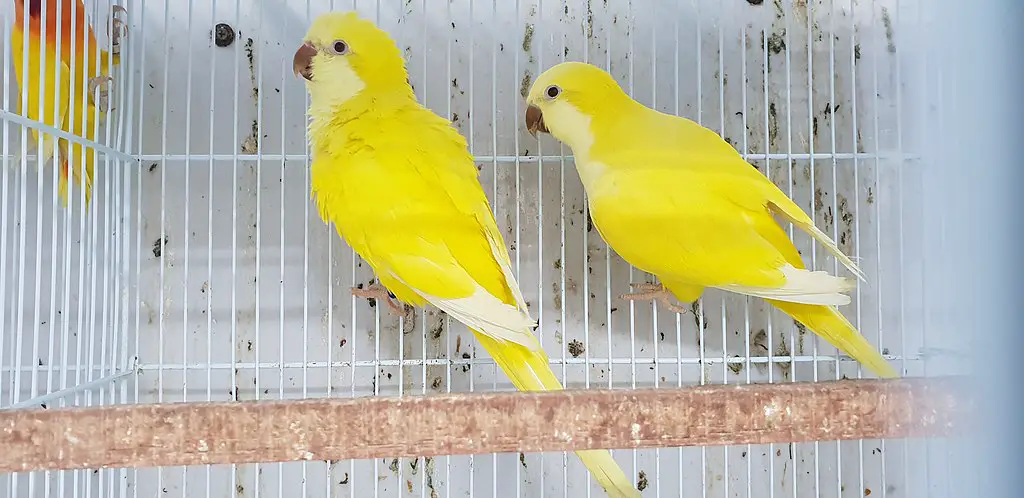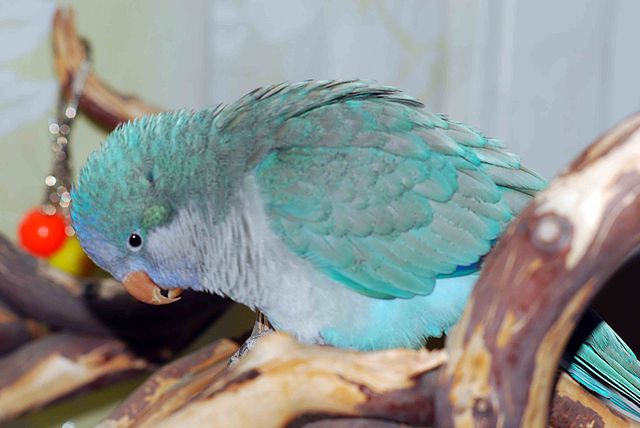Quaker Parrot | Interesting Facts
Great speaking ability, high intelligence and relatively low maintenance compared to larger parrots, these criteria are making quaker parrots popular day by day. It is even taking over cockatiels as the favorite bird.

They have big personalities and they take a lot of patience when you try to train a behaviour they don’t want to do yet.
If you prefer a quieter and more well-behaved bird, well, quaker might not be the right choice. If you don’t mind the screeching which can go on for hours and you don’t mind a bird who is very cage-territorial, get a Quaker.
So, before adopting a quaker lets see some interesting and unusual things about them:
Quakers are nest builder
Quaker parrots build nests with sticks, twigs in a tree or on a man made structure. Quakers are only parrots that make nests rather than using a hole on a tree or man made structure. Often they build a single large nest with separate rooms for each pair. The size of this single colony may reach the size of a private car.
This nest building behavior is also found in captivity. Your pet quaker may like to collect sticks, spoons to the favorite part of its cage or perches.
Poops shooter
This might be gross but in the wild quaker parrot shoots poops as defence. They also maintain nest hygiene to keep their nest/colony tidy by shooting it outside.
Your pet quaker parrot may also exhibit the same nature. They might shoot poops at you when they are angry or feel threatened. Do not expect that they will poop inside the cage. They might shoot poops to the floor just for fun.
Quaker parrot is illegal and restricted in some states of USA
If you are living in following states, you cannot have quaker parrot as pet or import or sell:
California, Colorado, Connecticut, Georgia, Hawaii, Idaho, Kansas, Kentucky, Maine, New Jersey, Pennsylvania, Tennessee, Wisconsin, Wyoming.
Maryland: Legal as long as you are not intent to release it.
Nebraska: It is considered a wild bird in Nebraska. You can own it with a Captive Wildlife Permit. Breeding is legal but selling is only restricted to permit holders.
Nevada: Legal but may not be released into the wild.
New York: Illegal to release into the wild. Only captive bred birds can be sold. All pet birds must be close banded.
Rhode Island: Legal with permission.
Quakers are cage aggressive
Cage aggression is considered normal behaviour of quakers by almost all owners. They are fine one day and sassy the next. You may have to use a glove sometimes to take your bird out before feeding.
It’s easier to take the bowls out and refresh food and water when they aren’t in there. That way they aren’t upsetting you and vice versa. Or take bowls out when they are distracted with something else.
Shaking, nibbling and Attitude
The shaking, as others have pointed out, is perfectly normal and one of their many endearing qualities. And yes, Quakers do have an attitude, which may be their most endearing quality of all. They are very much their own bird, which is why there is nothing like being loved by one.
As far as nibbling, it’s best to get used to it. They use their beaks for everything. It’s like a third foot for them. The thing to do if he starts nibbling too hard is briefly distract him with something else. But don’t “scold” him, they don’t interpret corrections like people and dogs do. They’re a prey animal, not a predator, so they think in terms of fear and safety and what we think of as correction is often expressed to them as fear or they interpret your reaction as being a game and then you end up encouraging the very thing you want to discourage. The best thing to do is reward the good behavior and ignore the bad behavior.
